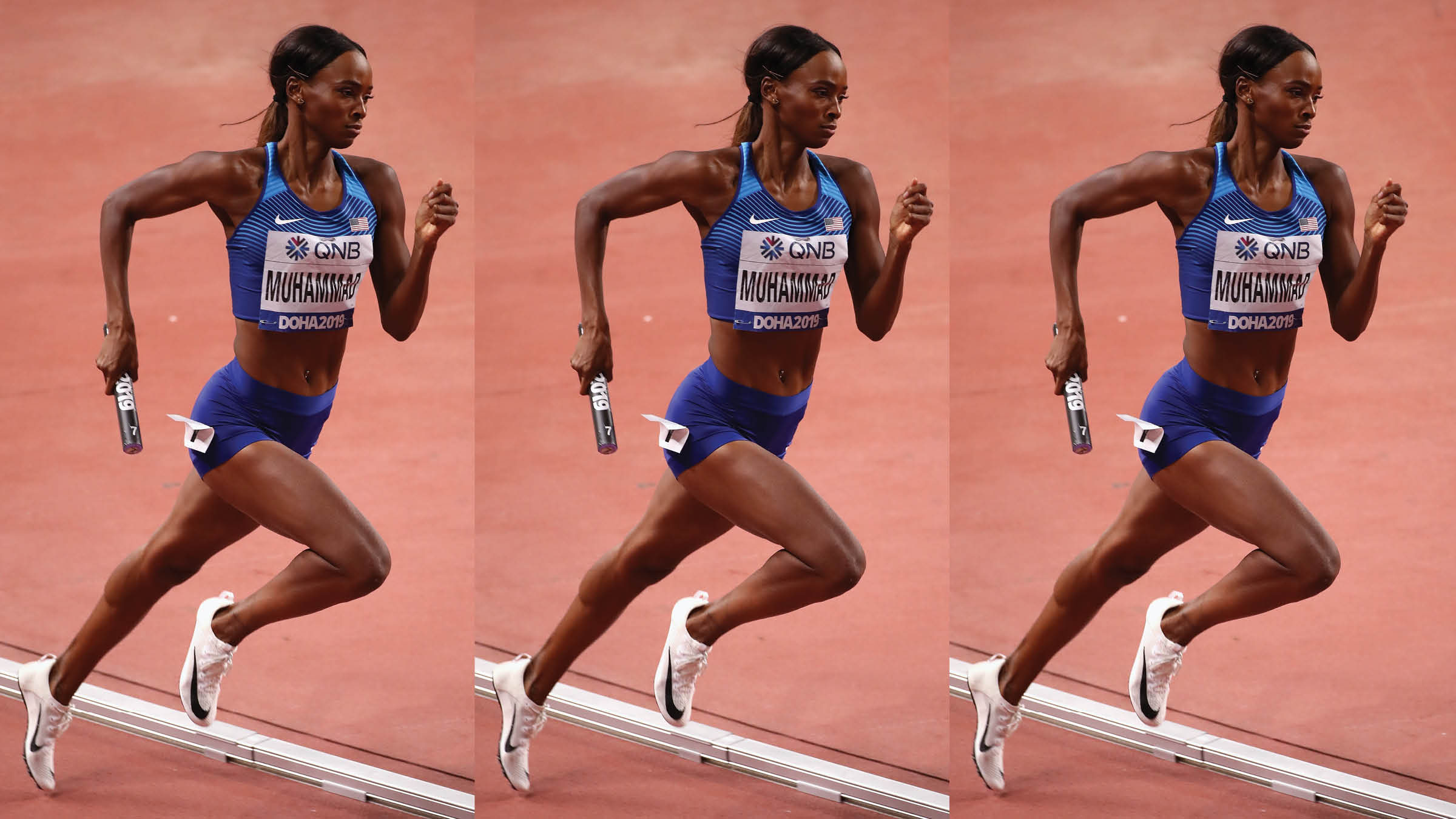Dalilah Muhammad: “I Really, Really Want to See All of Us Win.”

Near the end of each year, Dalilah Muhammad, Olympic gold medalist and 2019 world champion in the 400-meter hurdles, takes some time to envision the next one. In that process, she picks a power word to guide her. Or rather, one chooses her.
“It’s something that literally comes to me, something I truly feel internally,” she says.
Heading into 2019, she had her sights firmly set on medals and records. With young up-and-comer Sydney McLaughlin nipping at her heels, Muhammad wanted to secure her legacy as the best there ever was. She had an image of herself and McLaughlin heading toward a final hurdle neck and neck. Her word? Compete, which reminded her not to let off the gas until she’d crossed the line.
All year, Muhammad pushed to the finish, and prevailed. She won the U.S. championships in July, then the World Championships in Doha, in October, both by hundredths of a second over McLaughlin. In the process, she set the world record in the event twice, running 52.20 and then 52.16.
RELATED: 5 Ways Sydney McLaughlin is Making the Best of 2020
When she sat down to plan 2020, though, Muhammad’s crystal ball turned cloudy. Of course, she had the Tokyo Games on the calendar, but she couldn’t clearly see the Olympic year playing out. Training to defend the gold medal she won in Rio in 2016 would take tremendous energy. She wasn’t yet sure how to summon it.
“I just kind of pushed it aside and thought, ‘You know what? The word will come to me when it does naturally. Until that happens, I’ll just do what I normally do,” she says. “And then—COVID.”
She won’t go so far as to say she predicted the chaos 2020 would bring, but in retrospect, the murkiness feels prescient. When the Chinese and Japanese athletes she trains with in Los Angeles suddenly flew home in March, Muhammad realized the pandemic might have a serious impact. Upon the Games’ official postponement, the pause from competing offered her an opportunity to reflect and reconnect to her purpose.
RELATED: The COVID-19 Crisis: Pro Athletes Recalculate Their Careers
“Why I run has changed every single year that I’ve been running, and I’ve come to the clarity that that’s OK. As we grow as people, our ‘why’ should change,” she says. “For me, today, I feel like I have something more to give than just my athletic ability.”
So she’s broadened her view, making an effort to mentor younger athletes as well as connect to leaders in the sport. And, she’s used her voice for women and Black athletes. Last summer’s reckoning on racial justice brought conversations she’d long had behind closed doors into the open.
With the spotlight shining on the Black Lives Matter movement, Muhammad has shared her experiences on podcasts and in mainstream media outlets. She’s discussed how, as a dark-skinned Muslim athlete, she receives far less media attention than lighter women despite her dominance on the track. She’s been told directly she might have more funding and opportunities if she were white, and now she’s pulling back the curtain on that treatment.
“For so long, especially as Black athletes, we’ve been torn between wanting to speak up on certain issues, and honestly being afraid of what it would mean for us financially,” she says. “Now that you have this huge movement happening, it took away that fear. It came to the point where it’s now or never.”
At one point in her career, Muhammad might have viewed these pursuits as distractions from a champion’s singular focus. “But now, there’s so much more I’m willing to do. I no longer put my own needs over those of the generation that comes behind,” she says. “I’m thinking about all those things that come with wanting to push the sport forward.”
RELATED: Can We Run Away From Politics?
Not that she’s done competing—in fact, the bigger perspective has only rekindled her motivation. Based on her efforts in training, she believes 51 seconds is possible, and she’ll shoot for it. “At this point, it’s no longer the world record, but a PR. Technically, that’s always gonna be the goal,” she says.
The Olympic delay also gave her the opportunity to shore up some weaknesses. Her coach Lawrence “Boogie” Johnson incorporated endurance-based workouts she’d never done before, like sixteen 250- to 400-meter repeats with short recovery, that boosted her fitness. Now, she feels less fatigued even when sprinting. “I don’t think anyone would think that at age 30, you could become a better athlete,” she says. “But I feel like I break those barriers every day in training, and I see more and more how possible it is.”
So what’s her word for 2021? Muhammad has some ideas, but worries divulging them might diminish their power. She will share a vision for Tokyo, though: a sweep in the 400-meter hurdles, with American athletes standing on all three podium spots.
Right now, she, McLaughlin, and Shamier Little are ranked top three in the world, with Ashley Spencer and Kori Carter not far behind. If those who make the team all stay healthy and perform on the day, there’s no telling what they could accomplish for themselves—and, by extension, the sport.
“That’s what I would love to see and be a part of,” she says. “I’ve always wanted the best for all of them. But now I really, really want to see all of us win.”
This profile was first published in the Winter 2021 print issue of Women’s Running as part of “Women Who Lead: Power Women of 2021” which celebrates 25 women who are reshaping the running industry for the better. You can see the full list of honorees here.